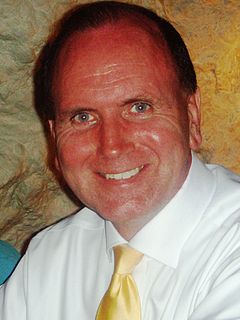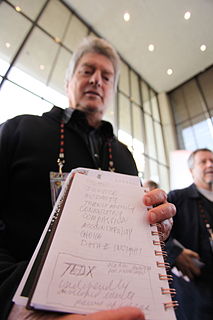A Quote by Jason Silva
Ideas are powerful because they allow us to see the world as it could be, rather than what it is.
Related Quotes
Ideas are very important to the shaping of society. In fact, they are more powerful than bombings or armies or guns. And this is because ideas are capable of spreading without limit. They are behind all the choices we make. They can transform the world in a way that governments and armies cannot. Fighting for liberty with ideas makes more sense to me than fighting with guns or politics or political power. With ideas, we can make real change that lasts.
So it can be for us as we allow the stirrings of hope to motivate us to action; and then as we act so that our hope becomes faith, that faith gives us power and enthusiasm for the principles of the gospel, which leads us to further action. Soon, we are lifted out of the state of hopelessness, and we begin to aid those around us by working to make the world a better place, rather than languishing in misery watching the world go by without us.
We cannot afford to be idle. To act on a bad idea is better than to not act at all. Because the worth of the idea never becomes apparent until you do it. Sometimes this idea can be the smallest thing in the world, a little flame that you hunch over and cup with your hand, and pray will not be extinguished by all the storm that howls about it. If you could hold onto that flame, great things could construct around it, that are massive and powerful and world changing, all held up by the tiniest of ideas.
There are more ideas on earth than intellectuals imagine. And these ideas are more active, stronger, more resistant, more passionate than "politicians" think. We have to be there at the birth of ideas, the bursting outward of their force: not in books expressing them, but in events manifesting this force, in struggles carried on around ideas, for or against them. Ideas do not rule the world. But it is because the world has ideas (and because it constantly produces them) that it is not passively ruled by those who are its leaders or those who would like to teach it, once and for all, what it must think.
The unreal is more powerful than the real. Because nothing is as perfect as you can imagine it. Because its only intangible ideas, concepts, beliefs, fantasies that last. Stone crumbles. Wood rots. People, well, they die. But things as fragile as a thought, a dream, a legend, they can go on and on. If you can change the way people think. The way they see themselves. The way they see the world. You can change the way people live their lives. That's the only lasting thing you can create.
Rather than seeking total control, relinquish it. You can't run the world, but you can entrust it to God. This is the message behind Paul's admonition to "rejoice in the Lord." Peace is within reach, not for lack of problems, but because of the presence of a sovereign Lord. Rather than rehearse the chaos of the world, rejoice in the Lord's sovereignty, as Paul did. Sovereignty gives the saint the inside track to peace. Others see the problems of the world and wring their hands. We see the problems of the world and bend our knees.
Too many politicians are shifting the critical themes of our national conversations from a 'big ideas' American Brand Platform to narrowly focused, polarizing sound bites that put party philosophy before what used to be heralded as the common good. These ideas, more often than not, divide us rather than serve to bind us.
For what is important when we give children a theorem to use is not that they should memorize it. What matters most is that by growing up with a few very powerful theorems one comes to appreciate how certain ideas can be used as tools to think with over a lifetime. One learns to enjoy and to respect the power of powerful ideas. One learns that the most powerful idea of all is the idea of powerful ideas.
Christ, in short, asks us to give everything, all our false redemption in the lifeboat, all our false ideas about who God is, all our trust in something other than God to redeem us. In so doing, we die to our broken natures in exchange for His perfect nature, and find unification with Him that will allow God to see us as one.






































